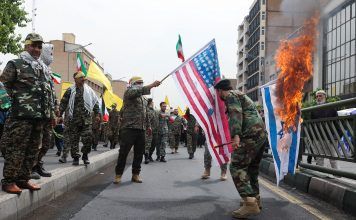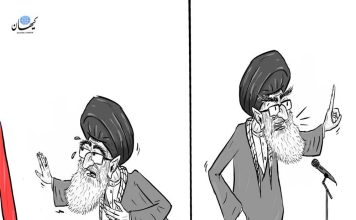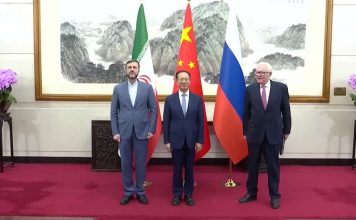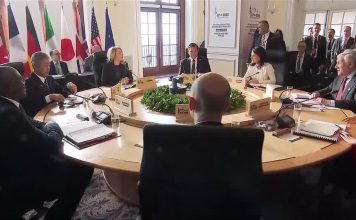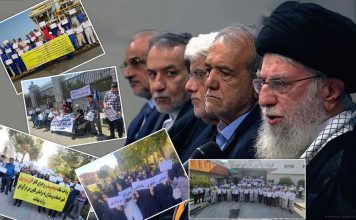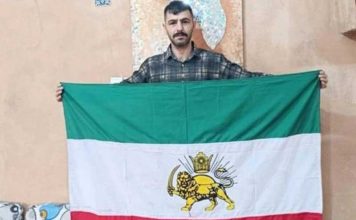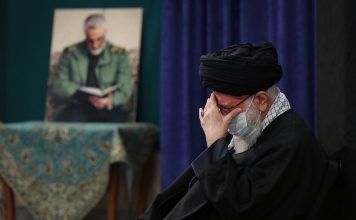By Kayhan Life Staff
Iran has imposed a more restrictive dress code on male state employees, banning them from wearing short sleeves and neckties at the workplace and in government offices.
The new measures were announced in May by Ali Khan-Mohammadi, the spokesperson for the “Enjoyment of Good and Forbidding of Evil” body (a state moral propriety body).
Iran introduced stringent dress codes for men a few years ago but eased them shortly afterward. However, the government has revived them as part of its plan to increase its control over the population.
[aesop_image img=”https://kayhanlife.com/wp-content/uploads/2023/05/2023-05-19T000000Z_1001368719_MT1NURPHO0007HQMGG_RTRMADP_3_IRAN-NEWS.jpg” panorama=”off” credit=” REUTERS./” align=”center” lightbox=”off” captionsrc=”custom” caption=”An Iranian policeman monitors an area in downtown Tehran, Iran, May 19, 2023.” captionposition=”left” revealfx=”off” overlay_revealfx=”off”]
The Interior Ministry has directed all government offices, institutions, and organizations to enforce the “Hijab and Chastity” scheme.
The ministry has asked the “Enjoyment of Good and Forbidding of Evil” body to monitor the implementation of mandatory hijab in government buildings.
In an interview with the Tehran-based Shargh news website on May 9, Mr. Khan-Mohammadi, also the director of the “Morality Patrol Managers’ HQ,” said: “We have directed all government organizations to enforce the ‘Hijab and Chastity’ measures both for women and men.”
“Women and men should wear proper attire in public places, particularly at work. We have issued specific directives in that regard,” Khan-Mohammadi noted. “The directives include a dress code in the workplace. The dress code for men should be enforced across the country and in all offices.”
“We have issued a guideline for the ‘Hejab and Chastity’ rules in offices,” Khan-Mohammadi explained. “The General Inspection Organization of Iran [GIO] has disseminated the same guideline. We have also shared them with the president’s office. They must enforce these rules.”
“The Supreme Council of the Cultural Revolution is dutybound under its articles 427 and 820 to monitor the dress code in government bodies,” Khan-Mohammadi said. “We urge their offices to enforce the dress code. Neckties symbolize the West and are, therefore, banned in government offices, as they were before.”
“Men should not wear tight-fitting trousers, short-sleeve shirts, [designer] brands, offensive outfits, and shorts,” Khan-Mohammadi warned. “First-time offenders will receive a warning. Their workplace security office will investigate a repeat offender for misconduct.”
[aesop_image img=”https://kayhanlife.com/wp-content/uploads/2023/05/2023-05-19T000000Z_1706735114_MT1NURPHO0007HQ0KM_RTRMADP_3_IRAN-NEWS.jpg” panorama=”off” credit=”REUTERS./” align=”center” lightbox=”off” captionsrc=”custom” caption=”An Iranian young woman without wearing mandatory headscarf looks at a veiled security woman while walking in downtown Tehran, Iran. May 19, 2023. ” captionposition=”left” revealfx=”off” overlay_revealfx=”off”]
It must be noted that there is no evidence that male government workers have ever worn tight-fitting trousers, neckties, and shorts at the workplace. Male employees have always been warned against wearing short-sleeve shirts in government offices.
“Men will be cautioned if they do not observe the dress code in public places and wear inappropriate clothes, such as shorts and tight-fitting outfits,” Khan-Mohammadi added.
The 48th Gathering of the Iranian Bar Associations Unions (SCODA) in Ahvaz, the capital of the southwestern province of Khuzestan, was reportedly canceled after several male lawyers attended the event wearing neckties.
According to the deputy director of SCODA’s Ahvaz chapter, the venue’s security officials stopped the event after several lawyers wore neckties, even though the conference hall’s managers had not previously issued a dress code or guidelines.
Although plainclothes Basij units have been stationed in universities, local mosques, offices, and government buildings for years, the ‘Hijab and Chastity’ scheme seems to be a ploy to boost their power to oppress the public.
The stricter hijab rules for women and men are part of a broader move by the Islamic Republic to deprive people of their civil and human rights. The government started enforcing the “Hijab and Chastity” scheme three weeks ago, initially enacted in the summer of 2022.
The scheme was introduced in July 2022 when Iranian President Ebrahim Raisi ordered the Supreme Council of the Cultural Revolution to enforce the “Hijab and Chastity Law.”
Mr. Raisi accused the “enemies of Iran and Islam” of using global TV and social media to “spread corruption and target cultural, religious principles.”
Since coming into office in August 2021, President Raisi and his hardline government have tried to restrict women’s civil rights and freedoms.
Speaking to reports on May 9, Judiciary spokesperson Masoud Setayeshi said: “The violators of the moral propriety rules will be penalized. They will not be given any special consideration. Also, Tehran has established a dedicated office for prosecuting offenders of the mandatory hijab law.”
“To expedite the process, the Judiciary has established a dedicated office to prosecute these violations,” Mr. Setayeshi added.
It seems the Judiciary is ostensibly creating a dedicated office to promote moral propriety, but in fact is supporting the IRGC and Basij forces in their efforts to curb the civil rights of people further.
Meanwhile, the Islamic Revolutionary Guards Corps (IRGC) commander for Greater Tehran, Brigadier General Hassan Hassanzadeh, said Basij (volunteer militias) patrolled subways, business districts, and public areas for Hijab violations.
Speaking at a gathering of secretaries of the “Enjoyment of Good and Forbidding of Evil HQ,” Basij departments of government offices and ministries, General Hassanzadeh said: “We must enforce ‘Hijab and Chastity’ in offices as we do in public places.”
“We could not take these measures before,” Hassanzadeh explained. “However, since last week, Basij units have issued polite verbal warnings to ‘Hijab and Chastity’ violators in metros, businesses, and public sites.”
Hassanzadeh said the IRGC would only enter a government building if asked to enforce mandatory hijab in those offices.
“An organization must act within the law, avoid violent confrontation, and be prudent when cautioning violators,” Hassanzadeh noted. “We must also do our utmost to expose and explain the enemy’s intentions to the employees.”
Iran Government’s Execution of Three Men Over Recent Demonstrations Draws Protests
The informal deployment of the IRGC and Basij units to government offices and public places to enforce restrictive dress codes on men is part of the Islamic Republic’s plan to stifle the public.
Authorities have also escalated their harassment of prominent cultural figures, artists, and celebrities. Many celebrities have defied the mandatory hijab rule while appearing in public or at social events.
Film actors Katayoon Reyhani and Pantea Bahram were fined $30 for “violating the hijab law in a public place and publishing photographs on social media.”
The Judiciary has also filed charges against several other female artists.
Commenting on the amount of the fine given by the court to the two actresses, the Tehran-based Hamshahri newspaper said: “If the report is correct, then it seems the court and the police have made a mistake in their calculations.”
“The question is whether the fine will be a deterrent. Imagine a judge informs a celebrity she has been fined $30. How will the celebrity react? She will most likely ask for a card reader. Is this meant to be a deterrent? Shouldn’t these punishments and fines be proportional to the time and circumstances?”
Despite the authorities’ best efforts to oppress the population, Iranian girls and women have been joined by men in challenging the mandatory hijab rules and defying the Islamic Republic’s oppressive regime.

